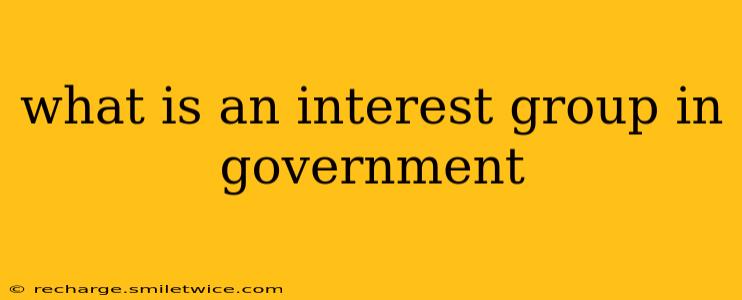Interest groups, also known as pressure groups, lobbying groups, or special interests, are organized collections of individuals who share a common interest and work together to influence government policy. They are distinct from political parties, which aim to control government, while interest groups focus on influencing specific policies relevant to their members' interests. Understanding their role is crucial to comprehending the dynamics of modern governance.
How Do Interest Groups Influence Government?
Interest groups employ various strategies to achieve their goals:
- Lobbying: Directly contacting government officials (legislators, executives, bureaucrats) to advocate for their policy preferences. This can involve providing information, building relationships, and offering testimony.
- Campaign Contributions: Providing financial support to candidates who align with their interests. This can significantly influence who gets elected and, consequently, the policies enacted.
- Grassroots Mobilization: Organizing public campaigns to raise awareness and generate public pressure on policymakers. This involves mobilizing members and the wider public to contact their representatives, participate in protests, and engage in other forms of activism.
- Litigation: Using the court system to challenge policies or regulations they oppose, or to advance their preferred policies through legal action.
- Public Relations: Shaping public opinion through media campaigns, advertisements, and other forms of communication to garner support for their cause.
What are Different Types of Interest Groups?
Interest groups are diverse and represent a wide range of interests:
- Economic Interest Groups: These groups represent the interests of businesses, industries, labor unions, and professional organizations. Examples include the Chamber of Commerce (business), the AFL-CIO (labor), and the American Medical Association (professional).
- Public Interest Groups: These groups advocate for the interests of the general public or specific segments of the population, often focusing on issues like environmental protection, consumer rights, or civil liberties. Examples include the Sierra Club (environmental), the American Civil Liberties Union (civil liberties), and Common Cause (government reform).
- Single-Issue Groups: These groups concentrate their efforts on a single, specific issue, such as gun control, abortion rights, or animal rights. Examples include the National Rifle Association (gun rights) and Planned Parenthood (reproductive health).
- Ideological Groups: These groups promote a particular ideology or set of beliefs, such as conservative or liberal viewpoints. Examples include the American Conservative Union and the American Federation of Teachers.
- Government Interest Groups: These groups represent the interests of various levels of government (national, state, local).
What are the Benefits and Drawbacks of Interest Groups?
Interest groups play a vital role in democratic societies, but their influence is a double-edged sword:
Benefits:
- Represent diverse interests: They give voice to a wide range of perspectives that might otherwise be unheard.
- Provide information: They offer policymakers valuable information and expertise on specific issues.
- Increase political participation: They encourage citizens to engage in the political process.
- Monitor government: They act as watchdogs, scrutinizing government actions and holding officials accountable.
Drawbacks:
- Unequal access to power: Wealthy and well-organized groups often have a disproportionate influence on policymaking.
- Potential for corruption: The close relationship between interest groups and policymakers can lead to corruption and favoritism.
- Policy gridlock: Intense lobbying from competing interest groups can lead to political gridlock and hinder effective governance.
- Distorted policy priorities: The focus on narrow interests can overshadow broader public concerns.
Are Interest Groups Constitutional?
The First Amendment of the U.S. Constitution protects the right to freedom of association, which is the foundation for the existence of interest groups. However, the influence of interest groups is a subject of ongoing debate and regulation, particularly regarding campaign finance and lobbying disclosure.
How Can I Learn More About Specific Interest Groups?
To learn more about a specific interest group, visit its website. Many groups provide detailed information about their mission, activities, and policy positions. You can also consult academic research and news articles to understand their impact on government policy.
This exploration provides a comprehensive overview of interest groups and their multifaceted role in the governmental landscape. Understanding their functions and impact is key to a deeper understanding of political processes.
